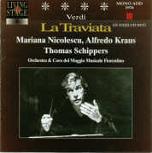Romanian soprano Mariana Nicolescu was a figure on the international opera scene throughout the late ’70s, ’80s, and ’90s; she last appeared at the Metropolitan (I believe) in 2001. The voice was colorful, nicely grainy, and intense, with a wiry vibrato, good top notes, and enough agility to sing many bel canto roles, Beatrice di Tenda and Maria di Rohan among them. She never quite achieved great stardom, and listening to this Traviata–a respectable performance–helps to explain why. Although she expresses her feelings well musically and has all the right instincts and notes (and almost the vocal weight) needed for the role, her Violetta is marred by very frequent sharp singing, and her habit of scooping up into notes in slow passages is exasperating. She’s undone by matters of both technique and taste.
Alfredo Kraus, the Alfredo, here a spry 49 years old, is his usual self, singing with ardor, taste, class, and impeccable pitch. He’s all elegant legato in the first- and last-act duets, his second-act aria is lovely, the “O mio rimorso” cabaletta is capped with a high-C any tenor would be proud to own, and his rage toward Violetta in the Gambling Scene is exciting. Baritone Angelo Romero, who sings Germont, may not be a household name, but that’s only right: he’s not bad, but he’s remarkable only for how pedestrian he is. You’ll rarely hear “Di Provenza il mar” sung with absolutely no rubato or pliancy; the notes are there but they’re robotic. He swings with a nice sweetness in the big duet with Violetta, however. The other singers are mundane.
Some of the blame must go to the normally interesting Thomas Schippers. Perhaps he was having a bad day or the show lacked rehearsal time, but the ensemble is sloppy, the chorus is downright mediocre, and someone should have given Romero hints about the music and character of Germont. What we have here is a genuinely unmoving Traviata. The sound is fine, by the way, but this is easily forgettable.
































